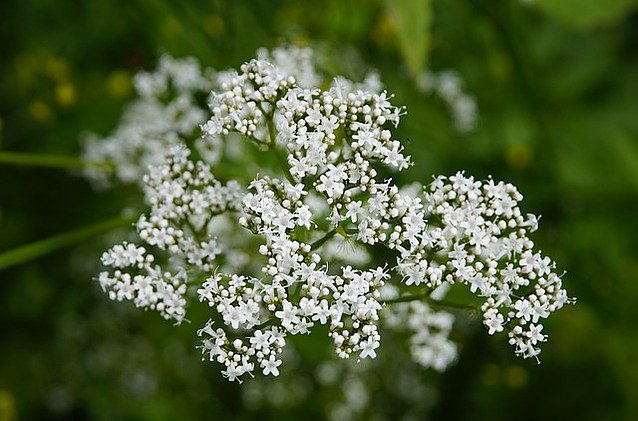In this Guide on Valerian Root for Diabetes, we will cover things you need to consider before taking Valerian root to help with your sleep issues. Most importantly, we will be covering the questions such as Should Diabetics Take Valerian Root To Aid Sleeping? When should people with diabetes consider valerian root? And when they should not? We will also delve into the research surrounding Valerian’s potential effects on sleep issues, specifically for individuals with diabetes. Then we will explore its historical uses, chemical constituents, and current evidence to determine whether it is safe and effective for diabetics seeking sleep aid.
Let’s start rolling…
Valerian is ranked among the top-selling sleeping remedies in the United States, and has been used as a sleeping aid for the longest time.
If you have diabetes, you may have experienced some sleeping problems, it’s either you’re getting inadequate sleep or getting too much sleep. You may even suffer poor sleeping habits, such as difficulty staying asleep or falling asleep.
Many people turn to herbal remedies and supplements such as Valerian to help them deal with those sleeping problems.
Valerian is a widespread herbal remedy often combined with other herbs and agents, which many people use as a sleeping aid.
Although it has received a number of positive attention and reviews, you may be want to know if it is as effective as they say. Or you may be concerned about the kind of effects it may have on your personal circumstances, ‘diabetes‘.
This article highlights and addresses these concerns and much more.
What is Valerian Root?
Valerian, also known as Amantilla and All-Heal, is a flowering plant native to parts of Asia and Europe. It is now also grown in other countries such as the US and China.
The name “valerian” comes from the Latin verb “valerie” which translates to “to be healthy” or “to be strong”.
Unlike the sweet-scented flowers, valerian roots have a very potent earthy odour because of various compounds and volatile oils, which accounts for its sedative effects. It has a long history of use in traditional medicine for promoting sleep and relaxation.
Valerian Plant
Centuries ago, beautiful flowers from the valerian plant were used to make perfumes. Its roots have been used in alternative medicine to treat insomnia and sleep disorders for more than 200 decades. The Greeks and Roman Empires used this herb in ancient times. Hippocrates also noted its use in the treatment of headaches, trembling, nervousness and heart palpitations.
Valerian preferably grows well in full sun and loamy soil with constant moisture. However, it can also adapt in places where these conditions are unattainable. It is not a native plant and can grow in almost any environment with cool weather and plentiful rain. The plant can be weedy, spread by seed and rhizomes.
Valerian is grown mainly for the medicinal properties of Valerian root, but other parts can also be used for many other purposes.
- Valerian root and stem
Aside from dietary supplements, valerian root is used in foods, teas and perfume.
- Valerian leaves
Its leaves measure up to 8 inches with about 4-9 odd-pinnate pairs of leaflets and a single terminal one. The leaves give off an aromatic scent when bruised. The oil from the leaves (and roots) are used as a flavouring in condiments, ice cream and baked goods.
- Valerian flowers
The fragrant star-shaped pale pink or white flowers of Valerian measures 0.2 inch each. They are arranged in umbels spreading 2-5 inches across, blooming every summer.
Tinctures can also be made from the flowers and used to encourage sleep. It is much milder than the root extract but still has sedative effects.
How Does Valarian Root Work?
The mechanism with which Valerian works, according to NIH, is rather inconclusive. Yes, many chemical constituents in Valerian have been identified, but it is still unknown which one is responsible for the Valerian’s sedative effects. It may be one of the chemicals, or a combination of various chemicals present in Valerian.
Nevertheless, valerian root contains valerenic acid – (a substance believed to affect gamma-aminobutyric acid receptors in our brain), and various other antioxidants such as linarin and hesperidin.
The attention valerian has received in scientific and pharmaceutical research is due to its interaction with gamma-aminobutyric acid (GABA) – a brain receptor that helps to regulate our brain’s nerve impulses.
While the exact mechanism of Valerian’s sedative effects remains inconclusive, it is thought to act as an anxiolytic and mild sedative, calming overexcited nerve cells.
When the nerve cells get overexcited due to fear or anxiety we experience, gamma-aminobutyric acid (GABA) is believed to serve the purpose of controlling these emotions. In other words, Valerian acts like an anxiolytic (anxiety-reducing drug) and a mild sedative that calms these nerve cells.
Valerian Health Benefits
Practitioners of alternative medicine believe that valerian root can treat various health conditions, some of which we will mention below:
- Insomnia and Sleep disorders
An estimated amount of 30% of people suffer insomnia – meaning they experience difficulty staying asleep, getting adequate/quality sleep or falling asleep.
Valerian is a very common herb used in the treatment of insomnia and other sleeping disorders. Taking Valerian may improve the quality of sleep as well as reduce the time it takes to fall asleep.
There are a few scientific evidences that support its efficacy, although not all of them are positive. Valerian root is also a great alternative herbal remedy for people dealing with sleep disorders while trying to refrain from the use of “sleeping pills”.
- Anxiety
The effectiveness of Valerian for anxiety has contradictory evidence.
Some studies have reported that some people’s stress level in social situations seems to reduce after taking Valerian, while others show no effect.
Valerian root can be used for anxiety and psychological stress conditions, including hysterical states, nervous asthma, excitability, headaches, stomach upset, migraines, and fear of illness (hypochondria).
While some scientific evidence supports its efficacy for improving sleep and reducing anxiety, more research is needed to establish its benefits for other conditions.
- Muscle and Joint Pains
Many women use valerian root for menstrual cramps and other symptoms associated with menopause, such as anxiety and hot flashes.
- Menopause Symptoms
A study found reductions in the severity of hot flash in menopausal women who used slightly high valerian doses (700mg) daily for about 8 weeks.
- Menstrual disorders
Valerian may improve behavioural, emotional, and physical symptoms of premenstrual syndrome (PMS) or painful menstruation.
- Depression
Some very old studies suggest that taking slightly higher doses of Valerian plus St. John’s wort reduces the symptoms of depression faster than lower doses.
- Stress
Some people claim that Valerian helps to reduce feelings of pressure, heart rate and blood pressure when under stress. One early research supports this claim, although the evidences are inconclusive.
Other possible conditions treated with Valerian include:
- Attention Deficit Disorder
- Restless Leg Syndrome
- Chronic Fatigue Syndrome
- Parkinson’s disease
- Epilepsy
- Mild tremors and various other conditions.
Remember, its effectiveness in treating these conditions are not yet proven scientifically. To clarify, here the summary of health benefits in a table for you to easily digest.
| Health Condition | Potential Benefits From Valerian Root | Scientific Evidence |
|---|---|---|
| Insomnia and Sleep Disorders | Improves sleep quality and reduces sleep onset time | Some supporting studies, more research needed |
| Anxiety | May reduce stress levels in social situations | Contradictory evidence, more research needed |
| Muscle and Joint Pains | Used for menstrual cramps and menopause symptoms | Anecdotal evidence, more research needed |
| Menopause Symptoms | May reduce the severity of hot flashes | Some supporting studies, more research needed |
| Menstrual Disorders | May improve symptoms of PMS and painful menstruation | Anecdotal evidence, more research needed |
| Depression | May alleviate symptoms faster in higher doses | Some supporting studies, more research needed |
| Stress | May help reduce feelings of pressure and anxiety | Some supporting studies, more research needed |
| Other Possible Conditions | ADHD, Restless Leg Syndrome, Chronic Fatigue Syndrome, Parkinson’s disease, Epilepsy, Mild tremors, and others | Limited scientific evidence, further research required |
Valerian and Diabetes – What Does Research Say?
The positive effects of valerian root on any health condition is yet to be proven. Although some studies suggest it may help treat insomnia.
Research on Valerian’s effects on blood glucose and diabetes is limited. Some studies suggest Valerian may help lower high blood pressure, but its impact on blood glucose in diabetics requires further investigation.
Research studies have shown there is a link between the breakdown of GABA (low GABA levels) in the brain and acute and chronic stress, which is related to low-quality sleep and anxiety.
Valerian root contains
- Valerenic acid – which prevents the breakdown of GABA in our brain and
- Antioxidants (including Linarin and Hesperidin) – which exhibits sleep-enhancing and sedative properties.
The valerenic acid works in the same way that Valium and Xanax (anti-anxiety medications) work. Many of the other compounds present in valerian root may also prevent excessive activity in the amygdala (that part of our brain responsible for the strong emotions we feel when stressed).
However, studies show that while it may improve sleep and reduce anxiety for some people, it may not affect others. Further conclusive research is needed to support its health benefits.
Research on the effects of Valerian on blood glucose is lacking, but some studies suggest that Valerian may help lower high blood pressure.
Valerian Preparation
Among the many valerian species existing in the wild, only the meticulously processed roots of Valeriana officinalis have been extensively studied.
Valerian is available as
- Ethanolic or aqueous extract, standardized to 0.8% valerenic acid.
- Whole powdered root
The constituents of a particular Valerian preparation depend on factors such as
- Specific Valerian species used
- The unknown proportions of the chemicals (including valerenic acid, alkaloids and sesquiterpenes) in the extract exhibiting CNS activity
- Method of extraction (ethanolic versus aqueous)
- And various other agents or herbs (such as hops) added to the combination.
Due to the varying constituents of Valerian preparations, it has been difficult to describe their pharmacokinetics.
Storage
Valerian is a dietary supplement usually made into forms such as – tablets, capsules, liquid extracts, tea, and tinctures. It needs to be stored in a light-resistant container away from light, and kept in a dark area.
Medical use of Valerian is not approved by the US Food and Drug Administration (FDA) and should not be used to replace drugs prescribed to you by your physician.
Dosage
There is no particular dosage for valerian root extracts or valerian root. The majority of valerian tablets and capsules usually come in considerably safe doses ranging between 300 – 600 milligrams standardized to 0.8% valerenic acid.
Scientifically researched doses include:
Oral dose for insomnia (take Valerian at least 30 mins to 2 hours before bedtime)
- 120 mg valerian extract with 80 mg lemon balm extract taken 3 times a day for about 30 days or
- Valerian extract 400 – 900 mg taken 2 hours before bedtime for up to 28 days or
- A product containing a combination of 187 mg valerian extract plus 41.9 mg hops extract per tablet, 2 tablets to be taken at bedtime for about 28 days
- 2 – 3 grams dried herbal valerian root (tea), soaked in a cup of hot water for about 10-15 minutes.
Tip: Valerian root has to be taken regularly for at least 2 to 3 weeks before results start to show. Also, it should not be taken for over a month without consulting your doctor. Prolonged use should be monitored by a healthcare professional to avoid side effects.
Oral dose for anxiety
Recommended valerian dose for anxiety is usually lower than the insomnia dosage to avoid daytime sleepiness.
- 120 – 200 mg valerian extract taken 3 times a day
Although the FDA tags valerian root as GRAS (“generally recognized as safe”), seek medical advice or a professional expert familiar with the use of health/herbal supplements while considering Valerian or other herbal supplements.
Overdose effects
Taking Valerian in safe doses may bring positive effects, but an overdose may cause an opposite reaction to its benefits. It may cause depression, anxiety, insomnia and so on.
To make sure you stick with the correct dosage, here is the dosage guidance for you in a table.
| Purpose | Recommended Dosage | Duration | Note |
|---|---|---|---|
| Insomnia | 300 – 600 mg Valerian root extract (0.8% valerenic acid) | 2 to 3 weeks | Take regularly for best results; consult a doctor if needed |
| Anxiety | 120 – 200 mg Valerian root extract, 3 times a day | As needed | Lower dosage to avoid daytime sleepiness |
| General Precautions | Follow dosage instructions on product labels | Varies depending on need | Avoid long-term use without medical supervision |
Seek medical help immediately.
What To Look Out For?
When you want to purchase Valerian dietary supplements, look out for products approved by independent agencies such as ConsumerLab, NSF International and USP (US Pharmacopoeia).
For teas and tinctures made from root shavings or “wild-crafted” roots, check to see if they’re certified organic per regulations of the Organic Foods Production Act of 1990. Except you preferably grow and prepare your own Valerian in your home.
Possible Side Effects
Valerian has a very pungent smell that many people dislike. It contains a compound similar to catnip which makes it attractive to cats. To minimize the risk of contamination, purchase valerian herbal supplements only from reliable sources.
- Short-term use of valerian root is safe and well-tolerated according to most clinical studies. However, possible side effects are mild and may include – dizziness, headache, itchiness, dry mouth, upset stomach, daytime drowsiness and vivid dreams.
- Excessive sleep: using Valerian combined with sedatives, alcohol, over-the-counter sleeping pills, some antidepressants, cold or flu medications containing diphenhydramine, codeine or doxylamine, may cause excessive sleepiness.
- Liver Damage: in rare cases, overuse of “wild-crafted” dried root of valerian supplements have led to liver damage. However, it is unclear whether the cause of the liver damage has anything to do with the valerian itself or product contaminants.
Here is a longer list of side effects people with diabetes should be mindful of.
| Possible Side Effects | Drug Interactions | Precautions for Diabetics |
|---|---|---|
| Dizziness | Interacts with medications for anxiety, high blood pressure, heart conditions, etc. | Consult a healthcare provider for personalized advice |
| Headache | Interacts with alcohol and certain medications | Monitor blood glucose levels and seek medical guidance |
| Dry mouth | Refrain from use if pregnant, nursing, or under 3 years old | |
| Vivid dreams | Avoid taking Valerian if driving or needing to stay alert | |
| Excessive sleepiness | Monitor liver health for individuals with liver disease |
Tip: When you want to discontinue Valerian after long-term use, it is best to start by slowly reducing doses over a week or two prior to ending it completely. This will help you avoid possible side effects.
Drug Interactions
Seek medical advice before using Valerian as it may interact with medications used in treating these conditions.
- Anxiety or depression
- High blood pressure, heart condition or high cholesterol
- Heartburn or gastrointestinal reflux disease (GERD)
- Cancer
- Infections (including malaria, HIV or tuberculosis)
- Allergies or asthma
- Erectile dysfunction
- Migraine headaches
- Psychiatric disorder
- Autoimmune disorders, psoriasis, or rheumatoid arthritis
- Seizures
Apart from this list, other drugs may interact with Valerian, such as vitamins, herbal products and over-the-counter medications.
Caution And Safety
Due to a lack of substantial and conclusive research evidence, Valerian may cause hepatotoxicity on foetus or babies. It is therefore not recommended for use if you are
- Pregnant
- A nursing mother or
- A child under 3 years of age
Do not use Valerian without medical advice if you are
- Allergic to Valerian
- Or if you suffer a chronic disease, such as diabetes.
Medicinal use: Inform your doctor beforehand if you intend to use Valerian for medicinal purposes to avoid injury. Prolonged medicinal use may lead to addiction.
Diabetes: Although the cases are rare, report to your doctor immediately if you experience blood glucose spikes when you use Valerian.
Alert: It is not advised to use Valerian if you have to stay alert or drive, since it may impair your reactions or thinking.
Surgery: Stop taking Valerian for at least 2 weeks before a scheduled surgery as it may interact with medications used during surgery, such as anesthesia.
Liver health/Alcohol: If there is a need for people with liver disease or heavy drinkers to use Valerian, extreme caution should also be exercised.
Ensure your liver enzymes remain functioning, healthy and regularly monitored.
Stop the use of Valerian and immediately call your doctor if you experience any signs of liver impairment such as nausea, persistent fatigue, dark urine, vomiting, jaundice (yellowing of the skin or eyes), or clay-coloured stools.
Should Diabetics Take Valerian Root To Aid Sleeping?
The question of whether people with diabetes should take valerian root or not has a lot to do with how safe it is for a diabetic. There are many controversies on this topic with no concrete evidence.
There have been reports that Valerian caused glucose spikes for some people with type 2 diabetes while it caused the glucose levels of some others with type 1 diabetes to drop, and vice versa. Some others suggest it might be as a result of interaction with drugs handled by the liver, causing the liver to suppress glucose production, though that may not be the case. Nevertheless, many believe that you can easily manoeuvre through these effects by adjusting the dosage through observation.
The opinions mentioned above are merely anecdotal reports of people with diabetes who used valerian root tablets as a sleeping aid. Although there are no research studies to support these claims, the potency of valerian root as a sleeping aid is undeniable. It not only solves insomnia but anxiety and even blood pressure issues.
Taking valerian root according to medical or pharmaceutical recommendations is typically safe for a diabetic with little or no side effects, but it must not be taken without your doctor’s say-so.
The below table highlights them further…
| Considerations for Diabetics | Recommendations |
|---|---|
| Lack of concrete evidence on Valerian’s effects on blood glucose | Consult a healthcare provider before using Valerian root as a sleep aid |
| Anecdotal reports show varied effects on blood glucose levels | Monitor blood glucose levels closely when starting Valerian root and adjust dosage as needed based on individual response |
| Potential interactions with diabetes medications | Seek medical guidance to avoid adverse drug interactions and ensure safety |
| Personalized advice for diabetics | Consult with a healthcare professional for personalized recommendations, considering individual health conditions and medications |
Conclusion
Valerian is a herbal supplement that may help people with diabetes who often battle with sleeping problems to promote relaxation, improve sleep and reduce stress. It is generally safe when taken in short-term, non-habit forming recommended doses. There are even cases where it may be able to replace “sleeping pills” and similar drugs such as benzodiazepines.
Some medications and drugs, even alcohol, may interact with Valerian and cause serious side effects. Thus, it should be taken with caution. Nevertheless, the most important thing is to consult with your doctor beforehand, especially if you have a serious or chronic health condition (e.g. diabetes).
Concerning the efficacy of Valerian as a sleeping aid, some studies suggest that many people have impressive results, while others may not see any improvements.
Given its potential benefits and safety, you may want to take a chance with Valerian after discussing your intentions with your doctor. Who knows, it may just improve your overall mood, sleep and ability to deal with anxiety or stress.












Hey, this was a really interesting article! As someone dealing with diabetes myself, I’m always keeping an eye out for natural stuff that could help manage my symptoms. I’d never even heard of using valerian root before – crazy that it might actually help regulate blood sugar! I definitely appreciate the honesty about potential side effects like drowsiness too. Those tips for taking valerian root with diabetes meds are super helpful. This herb sounds promising, but I’m definitely gonna run it by my doctor first, especially since I take insulin. Thanks for giving us such a thoughtful, balanced look at the research on the valerian root. Articles like this are so valuable for folks exploring complementary approaches like me. The info here gives me some great questions to discuss with my doc as I make decisions about managing my condition. Appreciate you putting this together!
Dear Eric,
Thank you for your positive feedback on the article about Valerian Root and its potential impact on diabetes and sleep! As experts on the topic, I’m thrilled to hear that you found the article interesting and valuable, especially as someone dealing with diabetes yourself.
Valerian Root is indeed an intriguing herb that has been studied for various potential health benefits, including its possible role in regulating blood sugar levels and aiding sleep. It’s essential to explore natural approaches that might complement diabetes management, but as you rightly mentioned, consulting with your doctor before trying any new supplement or herb, especially if you take insulin, is crucial.
I’m glad you appreciated the honesty about potential side effects, such as drowsiness, and found the tips for taking Valerian Root with diabetes medications helpful. Being cautious and informed about possible interactions with diabetes medications is essential for your safety and well-being.
As experts, our aim is to provide a thoughtful and balanced look at the research on Valerian Root to empower individuals like you to make well-informed decisions about managing your condition. I’m glad the article gave you valuable questions to discuss with your doctor. Open communication with your healthcare provider is key to incorporating any complementary approach into your diabetes management plan.
If you have any more questions or need further information about Valerian Root, diabetes management, or other natural approaches, feel free to ask. We are here to provide support and assist you in your journey towards better health and well-being.
Thank you again for your kind words, and I’m glad the article was helpful to you!